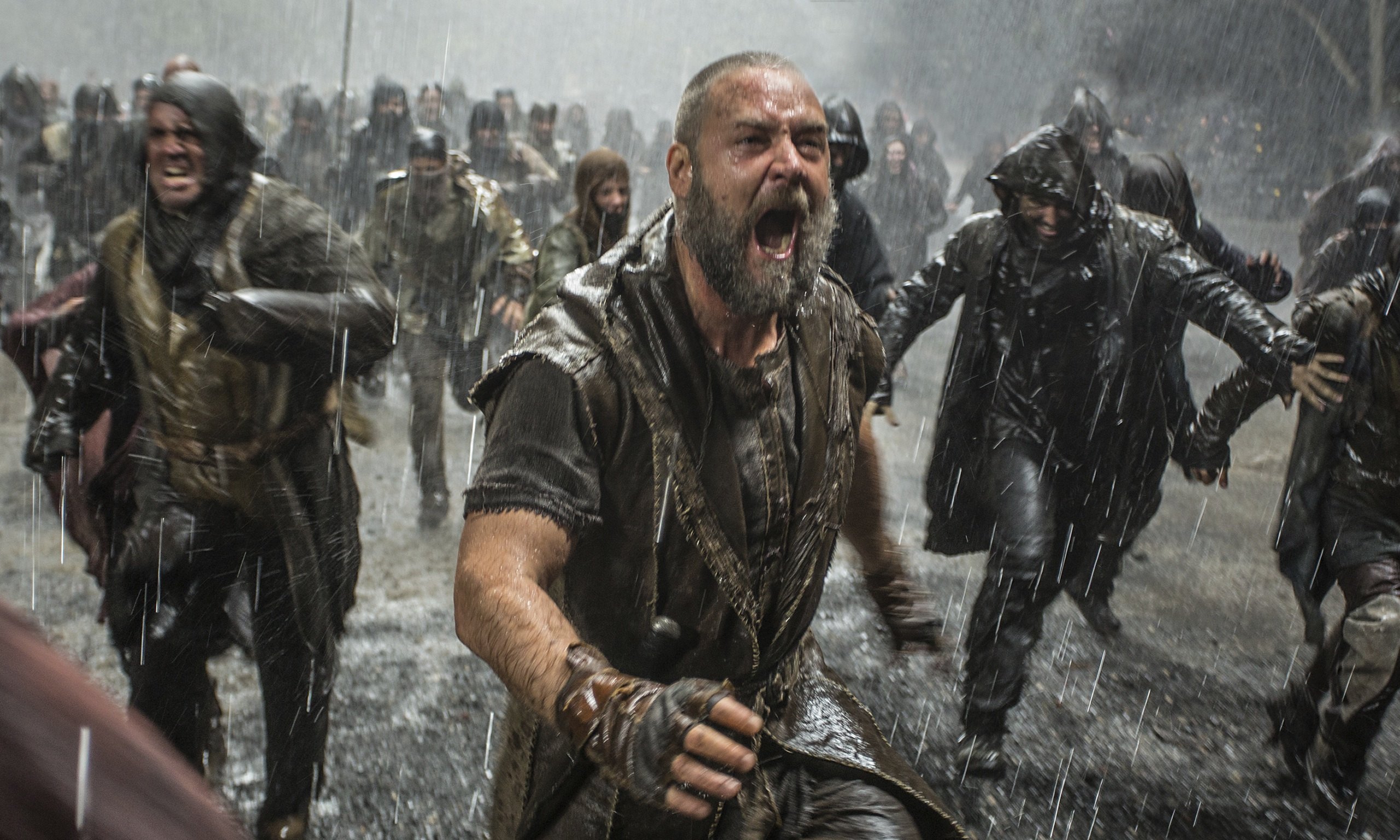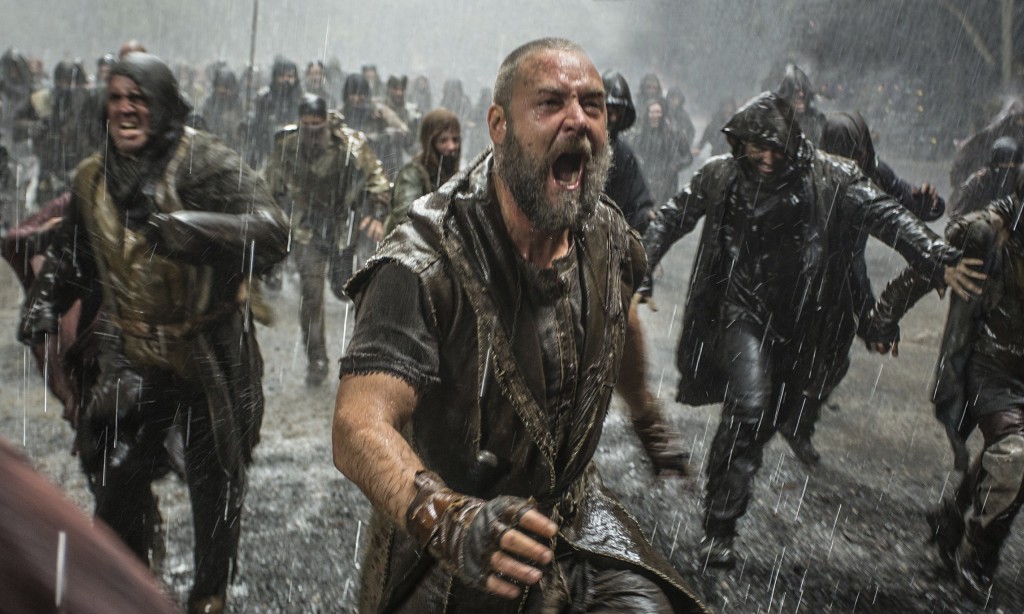By Michael Scoular (The Cascade) – Email
Print Edition: April 2, 2014
Thirty seconds in, Darren Aronofsky’s Noah announces that, unlike the near-religious exacting preservation given to young adult novels-turned-movies, this is not about to be accepted as canonical devotional material. For this, the movie has become a target for a lot of talk about what it gets “wrong.”
But considering the fires of controversy had little interest in the Coen brothers’ creative license with the story of Job (A Serious Man), or Terrence Malick’s using the Song of Songs as inspiration (To the Wonder), it might be more accurate to say the problem with Aronofsky’s movie isn’t its fidelity to the Old Testament story (which shows up in some unexpected ways), but that it yells and thuds with its own heavy literalness. It insists on its importance, from the opening chorus stabs of Clint Mansell’s bombastic (but mostly bad, temp-track-sounding) score that kicks off a Sunday school flipbook recapping the fall, to the apocryphal Watchers that explain a somewhat sped-up industrial progression of history (but mostly resemble distant kin of Treebeard).
Like most of the story beats in Noah, there’s a Biblical reference to refer back to (brothers Cain and Seth diverged, with the former forming a city, the latter’s line reaching down to Noah), but Aronofsky is only concerned with effects (the world … split in two!), to the neglect of the life his philosophically-conflicted protagonist belabours needs some form of justice.
Aronofsky, whose previous works tried to achieve the shock of a horror movie with the pathos of religious belief, and whose thematic concerns dabbled in how an actor might be transformed by a role (Black Swan) or a story might intertwine with life’s possible outcomes (The Fountain) shows a creative limitation in Noah. Without those movies’ frenetic subjectivity or amber-tinted awe, Aronofsky only has ideas. And he piles them on. Noah’s story is used both as a blatant parallel to today’s industrial use of the world and as a foil to the idea of human exceptionalism. Because this is an Aronofsky movie, divine hints only come in the form of dream scene fake-outs, so Russell Crowe’s Noah, already a humourless crusader for the environment, is alternately plagued with a brainwash-like determination and unresolvable doubt. Around this unmoveable character, Aronofsky also plants other dilemmas that carry the weight of other stories (Abraham’s test, Jesus’ garden trial), but mostly come across as nonsensical: humanity only destroys and deserves to be wiped off the face of the Earth, but family needs to be protected in the face of bloodthirsty raiders (?), and also if existence is going to be extended, it’ll be through a story redolent of late developments from … The Twilight Saga.
While the ties to Christian and Jewish traditions are unavoidable, Noah’s purpose seems to lie elsewhere: as a work of fantasy, in the sense of using a step out of reality to comment on the present, but also in the sense where fantasy is the dominant mode of expression in popular American cinema, one that abandons actors for spectacle. Noah’s script (written by Aronofsky and Ari Handel) follows the over-familiar hero conflict pattern everybody knows, and repeats simplified dialogue built out of trailer catchphrases (“It begins,” “That! is justice!”) which the cast speaks with a slightly British accent to indicate there’s something to link this to a grand tradition.
With all the room made for plot machinery and pointless action, there’s hardly any space for the cast (Crowe, Jennifer Connolly, Emma Watson, Logan Lerman) to do anything besides stare agape, cry on cue, and ask father Noah what to do.
A supposedly mature work, Noah is actually Aronofsky’s least distinctive. As with another recent “religious” tale (Life of Pi), amazement at computer effects is considered synonymous with proof of God. Faces framed by dreamy haircuts for the young, wizardly wisps for the old are slabbed with follow-the-speaker automation. The animals, you might think, provide some levity from the grays and browns of tar pitch woodwork and grimy war-mongering, but when they arrive, it is as a computer demo, obediently passing by. With all the effects and a similar message, Noah could pass, for those 10 minutes, as a lesser live-action Studio Ghibli effort, but before long it’s back to unanswering skies and indifferent medium shots, a far cry from the widescreen over-sincerity that characterized the ‘50s wave of American Christian-era epics.
Now, when Aronofsky holds a shot of silhouetted morning light, or rolls out a milennia-compressed time-lapse, it arrives with an even heavier hand, asking all of an audience’s care in interpretation while weakly repeating techniques he overplayed to death 10 years ago. A creation sequence like Terrence Malick’s or a flood scene from Wes Anderson involve a thoughtful, roving soul and humour. Aronofsky, though, is a neither/nor filmmaker: neither someone whose sacred texts are worth studying, nor a genre artist whose messes are still interesting ones.



